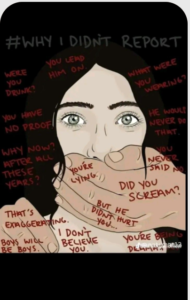
Brené Brown said Shame is the intensely painful feeling or experience of believing that we are flawed and therefore unworthy of love and belonging. “I am bad.” ” I am a mess.” The focus is on self, not behaviour, with the result that we feel alone. Shame is never known to lead us toward positive change.
Sexual abuse is a deeply traumatic experience that can have profound and long-lasting effects on survivors. One of the most challenging aspects survivors often face is the overwhelming burden of shame associated with their experiences.
Shame, in the context of sexual abuse, is the feeling of guilt, embarrassment, and self-blame that can consume survivors. It stems from societal attitudes and misconceptions surrounding sexual assault, which often place blame on the survivor rather than holding the perpetrator accountable.
It is important to emphasize that shame should never be placed on the survivor. Sexual abuse is never the fault of the person who has experienced it. However, due to societal stigma and victim-blaming attitudes, survivors may internalize this shame and carry it with them long after the abuse has occurred.
The weight of this shame can be incredibly isolating for survivors, making it difficult for them to seek support or disclose their experiences to others. It can also contribute to feelings of low self-esteem, self-doubt, and even lead to mental health issues such as depression or anxiety.
Breaking free from this burden requires a supportive environment where survivors are believed, validated, and encouraged to seek help. It is crucial for society as a whole to challenge victim-blaming narratives and promote empathy and understanding towards those who have experienced sexual trauma.
Sexual abuse is a deeply traumatic experience that leaves lasting emotional scars. One of the most devastating aspects of this heinous act is the overwhelming sense of shame that survivors often carry with them. The weight of shame can be suffocating, causing individuals to feel isolated, powerless, and burdened by their own experiences.
It is important to acknowledge that the shame associated with sexual abuse does not belong to the survivor. It is a misplaced burden placed upon them by societal stigma and misconceptions. No one should have to carry the shame for the actions perpetrated against them.
It is essential for society as a whole to challenge victim-blaming attitudes and provide resources for survivors of sexual trauma. By doing so, we can foster empathy, understanding, and ultimately work towards eradicating the pervasive culture of shame surrounding this issue.
Understanding this, it becomes crucial to create a safe and supportive environment for survivors to share their stories and seek healing. By breaking down the barriers of shame, we can empower survivors to reclaim their narratives and find strength in their journey towards recovery.
Remember, if you or someone you know has experienced sexual abuse or trauma, there are support networks available such as Mosaic Unveiled to help navigate through these difficult emotions. You are not alone in your struggle, and there is hope for healing beyond the weight of shame.
#survivor#healing#youarestrongerthanyouthought#mosaicunveiled
